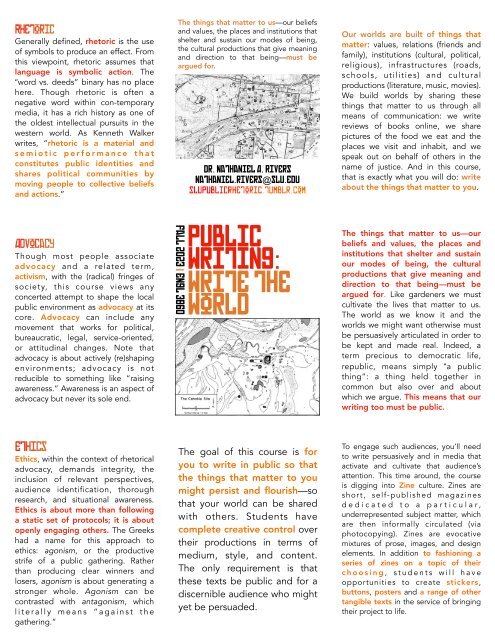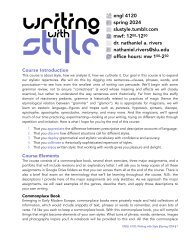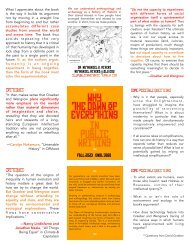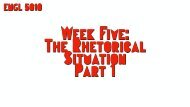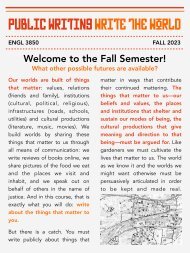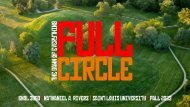ENGL 3860 Zinyllabus (FA23)
Create successful ePaper yourself
Turn your PDF publications into a flip-book with our unique Google optimized e-Paper software.
Rhetoric<br />
Generally defined, rhetoric is the use<br />
of symbols to produce an effect. From<br />
this viewpoint, rhetoric assumes that<br />
language is symbolic action. The<br />
“word vs. deeds” binary has no place<br />
here. Though rhetoric is often a<br />
negative word within con-temporary<br />
media, it has a rich history as one of<br />
the oldest intellectual pursuits in the<br />
western world. As Kenneth Walker<br />
writes, “rhetoric is a material and<br />
s e m i o t i c p e r f o r m a n c e t h a t<br />
constitutes public identities and<br />
shares political communities by<br />
moving people to collective beliefs<br />
and actions.”<br />
The things that matter to us—our beliefs<br />
and values, the places and institutions that<br />
shelter and sustain our modes of being,<br />
the cultural productions that give meaning<br />
and direction to that being—must be<br />
argued for.<br />
Dr. Nathaniel A. Rivers<br />
nathaniel.rivers@slu.edu<br />
slupublicrhetoric.tumblr.com<br />
Our worlds are built of things that<br />
matter: values, relations (friends and<br />
family), institutions (cultural, political,<br />
religious), infrastructures (roads,<br />
schools, utilities) and cultural<br />
productions (literature, music, movies).<br />
We build worlds by sharing these<br />
things that matter to us through all<br />
means of communication: we write<br />
reviews of books online, we share<br />
pictures of the food we eat and the<br />
places we visit and inhabit, and we<br />
speak out on behalf of others in the<br />
name of justice. And in this course,<br />
that is exactly what you will do: write<br />
about the things that matter to you.<br />
Advocacy <br />
Though most people associate<br />
advocacy and a related term,<br />
activism, with the (radical) fringes of<br />
society, this course views any<br />
concerted attempt to shape the local<br />
public environment as advocacy at its<br />
core. Advocacy can include any<br />
movement that works for political,<br />
bureaucratic, legal, service-oriented,<br />
or attitudinal changes. Note that<br />
advocacy is about actively (re)shaping<br />
environments; advocacy is not<br />
reducible to something like “raising<br />
awareness.” Awareness is an aspect of<br />
advocacy but never its sole end.<br />
Fall 2023 l <strong>ENGL</strong> <strong>3860</strong><br />
Public<br />
Writing: <br />
Write the<br />
World<br />
The things that matter to us—our<br />
beliefs and values, the places and<br />
institutions that shelter and sustain<br />
our modes of being, the cultural<br />
productions that give meaning and<br />
direction to that being—must be<br />
argued for. Like gardeners we must<br />
cultivate the lives that matter to us.<br />
The world as we know it and the<br />
worlds we might want otherwise must<br />
be persuasively articulated in order to<br />
be kept and made real. Indeed, a<br />
term precious to democratic life,<br />
republic, means simply “a public<br />
thing”: a thing held together in<br />
common but also over and about<br />
which we argue. This means that our<br />
writing too must be public.<br />
Ethics<br />
Ethics, within the context of rhetorical<br />
advocacy, demands integrity, the<br />
inclusion of relevant perspectives,<br />
audience identification, thorough<br />
research, and situational awareness.<br />
Ethics is about more than following<br />
a static set of protocols; it is about<br />
openly engaging others. The Greeks<br />
had a name for this approach to<br />
ethics: agonism, or the productive<br />
strife of a public gathering. Rather<br />
than producing clear winners and<br />
losers, agonism is about generating a<br />
stronger whole. Agonism can be<br />
contrasted with antagonism, which<br />
l i t e r a l l y m e a n s “ a g a i n s t t h e<br />
gathering.”<br />
The goal of this course is for<br />
you to write in public so that<br />
the things that matter to you<br />
might persist and flourish—so<br />
that your world can be shared<br />
with others. Students have<br />
complete creative control over<br />
their productions in terms of<br />
medium, style, and content.<br />
The only requirement is that<br />
these texts be public and for a<br />
discernible audience who might<br />
yet be persuaded.<br />
To engage such audiences, you’ll need<br />
to write persuasively and in media that<br />
activate and cultivate that audience’s<br />
attention. This time around, the course<br />
is digging into Zine culture. Zines are<br />
short, self-published magazines<br />
d e d i c a t e d t o a p a r t i c u l a r ,<br />
underrepresented subject matter, which<br />
are then informally circulated (via<br />
photocopying). Zines are evocative<br />
mixtures of prose, images, and design<br />
elements. In addition to fashioning a<br />
series of zines on a topic of their<br />
choosing, s t u d e n t s w i l l h a v e<br />
opportunities to create stickers,<br />
buttons, posters and a range of other<br />
tangible texts in the service of bringing<br />
their project to life.


